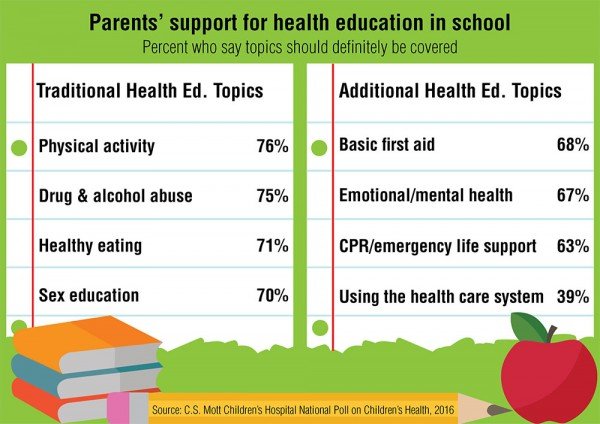
Credit: C.S. Mott Children’s Hospital National Poll on Children’s Health
Teaching kids about drugs, alcohol and sex appears to be less controversial than ever before with the majority of parents in a new poll saying schools should and do teach these subjects.
Many parents want more — saying those topics are not enough — finds the University of Michigan C.S. Mott Children’s Hospital National Poll on Children’s Health. Researchers surveyed a nationally representative sample of parents with kids in middle or high school.
Two-thirds of parents polled say schools should definitely cover emotional and mental health issues — which may include such subjects as dealing with depression, stress and bullying — yet only a third say these topics are currently covered by their child’s school.
Another 68 percent of parents want to see schools cover basic first aid, and 63 percent say kids should learn CPR.
“Most parents today support traditional health education topics like pregnancy prevention, drug abuse and other risk behaviors that used to generate more debate in years past. However, they clearly perceive a gap between what their children need and what they are receiving in the area of mental health education, as well as basic first aid and CPR,” says Sarah Clark, M.P.H., co-director of the C.S. Mott Children’s Hospital National Poll on Children’s Health.
“We are seeing increasing concerns for such issues as stress, depression and suicide among young people, and parents want schools to be a part of the solution. These results suggest that the stigma of mental health issues may have relaxed among today’s parents, in favor of using a broad array of resources to help children and adolescents with these critical areas.”
Changing trends in health education
Mental health topics dominated parent concerns in an August Mott Poll report on the top 10 child health concerns, with bullying, stress, suicide and depression all making the list. Teen suicide is a growing health concern, recently moving from the third to second leading cause of death for adolescents, surpassed only by car accidents, according to the American Academy of Pediatrics.
Sex education has come a long way from 1975 when nearly half of state legislatures voted to restrict or abolish it compared to today when most adolescents in the U.S. receive some form of sex education between sixth and 12th grade.
Parent perspectives reflect the trend, too, with more than two-thirds of parents polled saying traditional health topics should definitely be covered at their child’s grade level, including physical activity, drug and alcohol abuse, healthy eating and sex education and pregnancy prevention. Most parents say these topics are currently taught at their school.
Nearly four in 10 parents (39 percent) also believe schools should educate students on how to use the health care system. But only one in 10 parents say the topic is covered in their child’s school. Low-income parents are more likely to say schools should teach students how to use the health care system — perhaps, Clark notes, because these parents face challenges themselves in accessing health care.
Clark also notes that schools face significant barriers in expanding their formal health education curriculum. Core academic requirements, parent or student preferences for electives and the financial burden of hiring more teachers can limit opportunities to expand health education courses.
But schools may seek other strategies such as recruiting health care professionals from local hospitals or clinics or nonprofits to offer occasional sessions on first aid or CPR. Schools with onsite health centers may ask those staff to expand their educational sessions.
“Most parents believe schools are on the right track with what kids are learning in health education, but recognize that today’s youth face a growing set of issues impacting their health,” Clark says. “School leaders may consider ways to incorporate health topics in the classroom.”
See more at: http://mottnpch.org/reports-surveys/beyond-sex-ed-parents-want-more-health-topics-covered-school
Story Source:
The above post is reprinted from materials provided by University of Michigan Health System. Note: Content may be edited for style and length.
The post Parents in favor of expanding health education appeared first on Scienmag.





